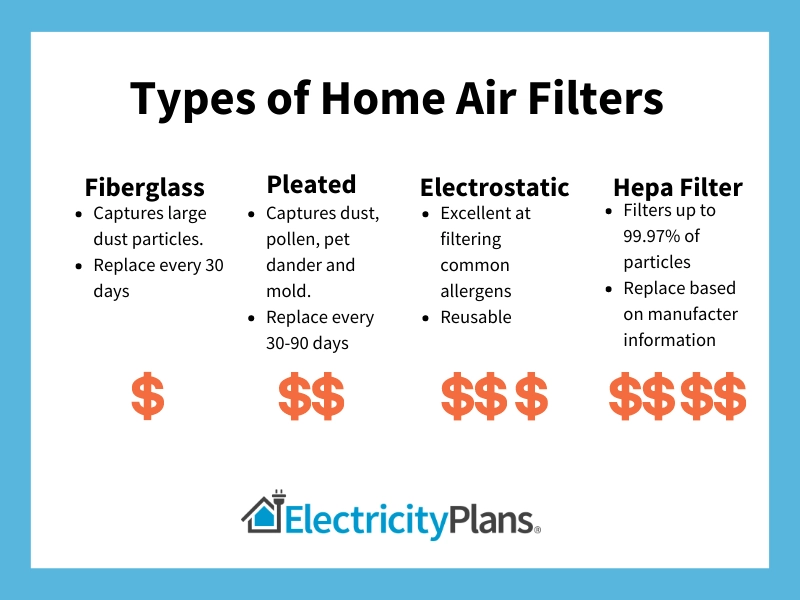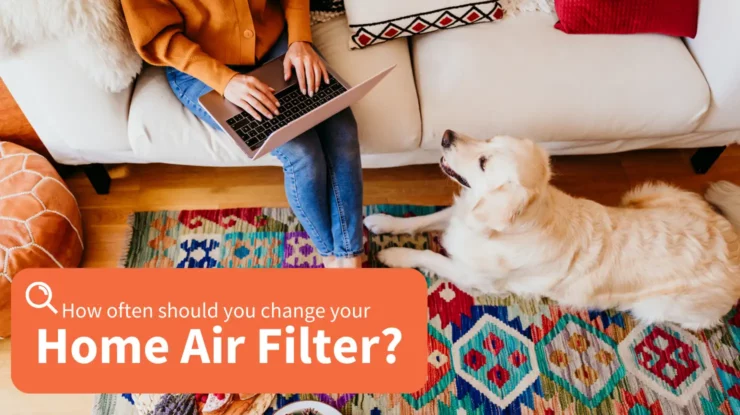You’ve probably heard that it’s important to change your home air filter regularly. But why is it so important? And what type of air filter do you need?
First, in our commitment to saving you time and energy, here’s a quick answer:
Change your home air filter every 30-90 days. If you have pets in your home, you should change your air filter every 30 days.
How Often Should You Change Your Home Air Filter?
If you ask HVAC professionals, they’ll tell you that changing your air filter is the number one thing you can do to improve your system’s operating efficiency. That helps you save on your electricity bill.
Here’s what our experts say.
Dirty filters cause your A/C system to work harder and not cool properly.
– Shane Sammons, Sammons Air & Heat, Houston TX
As filters get dirtier, efficiency decreases and eventually people call saying their system is not cooling. It is important that you change those filters, especially in the summer.
–Gary Poe, Poe Air, Ft Worth TX
The role of the air filter is to remove particles from your home, improve the efficiency of your HVAC system and keep debris out of your HVAC system. With that in mind, we suggest changing it on the first of every month for best results.
Benefits of Changing Your HVAC Filter Regularly
The benefits of changing your HVAC filter regularly include:
- Efficiency. Your HVAC isn’t as efficient at cooling if your air filter is dirty. If it’s dirty and clogged, the HVAC system has to work harder to pull air in. That means it will use more energy to cool your home.
- System Longevity. Your HVAC system will last longer if you take care of it. The number one thing you can do to maintain your HVAC system is change the air filter regularly.
- Air Quality. Your air filter collects a lot of “stuff.” Do you really want to breath air that’s been filtered through all that?
What Type of Home Air Filter Do I Need?
The type of air filter you need depends on your home environment, budget and goals. For example, if you have someone in your home with allergies, you may want to spend a little more.
Below are some common types of filters and how they compare.
Types of Home Air Filters
Here are the 4 most common types of home air filters for your HVAC.
- Fiberglass Filters. These are the most basic and inexpensive filters available. They are made of layered fiberglass fibers and primarily capture larger dust particles. They provide some level of protection for your HVAC system but will not capture all dust and pollen.
- Pleated Filters: Pleated filters are made of polyester or cotton. Their folded design provides a larger surface area, which lets them capture smaller particles like pollen, pet dander and mold. Pleated filters range from 1 inch thick standard filters to 5 inch thick box filters.
- Electrostatic Filters: These filters use an electrostatic charge to attract and capture particles. Have allergies? These may be the filters for you since they are highly effective at trapping small particles. They come in disposable and reusable varieties. We love the idea of wash, rinse and repeat.
- HEPA Filters: At the high end, a High-Efficiency Particulate Air (HEPA) filters is one of the most efficient (and expensive) home air filters available. They can capture up to 99.97% of particles as small as 0.3 microns. HEPA filters are excellent at removing common allergens, such as dust mites, pollen, and mold spores.
Should I use a high-efficiency HVAC filter for my home? Higher-efficiency filters or pleated box filters generally offer better air purification but may require more frequent cleaning or maintenance due to increased airflow resistance. Talk to your HVAC professional or check with your HVAC manufacturer.

What is a MERV Rating (and Why Does it Matter?)
MERV stands for Minimum Efficiency Rating Value. The MERV rating scale for home air filters ranges from 1 to 16. Higher numbers = higher filtration. MERV is a standardized way to compare how effective the air filter is at capturing and removing particles from the environment.
Filters with lower MERV ratings, such as 1 to 4, are generally used in residential setting. They’re good at capturing larger particles like dust and pollen.
Filters with higher MERV ratings, typically 13 to 16, are often used in commercial settings or homes where someone may have allergies, asthma or other respiratory conditions. They can capture and screen out very small articles, including allergens and even bacteria.
However, with that higher level of filtration comes higher airflow resistance. That can cause your HVAC to work overtime. Check with an HVAC professional or A/C user’s manual to find out what MERV rating is best for your system.
What Does A Dirty Home Air Filter Look Like?
You’ve seen your air filter when it’s new, right? And you know it’s there to keep dust, pollen, pet dander, dirt, allergens and pet hair out of your central HVAC unit.
So you can imagine what a dirty air filter will look like, based on what it collects.
When you open the air register, you’ll find your filter looks grey from dust particles and dirt. If you have pets, you may also find that it’s covered with pet hair.
Before you scroll on to your next article, go check your air filter. And if it’s dirty? Change it!
